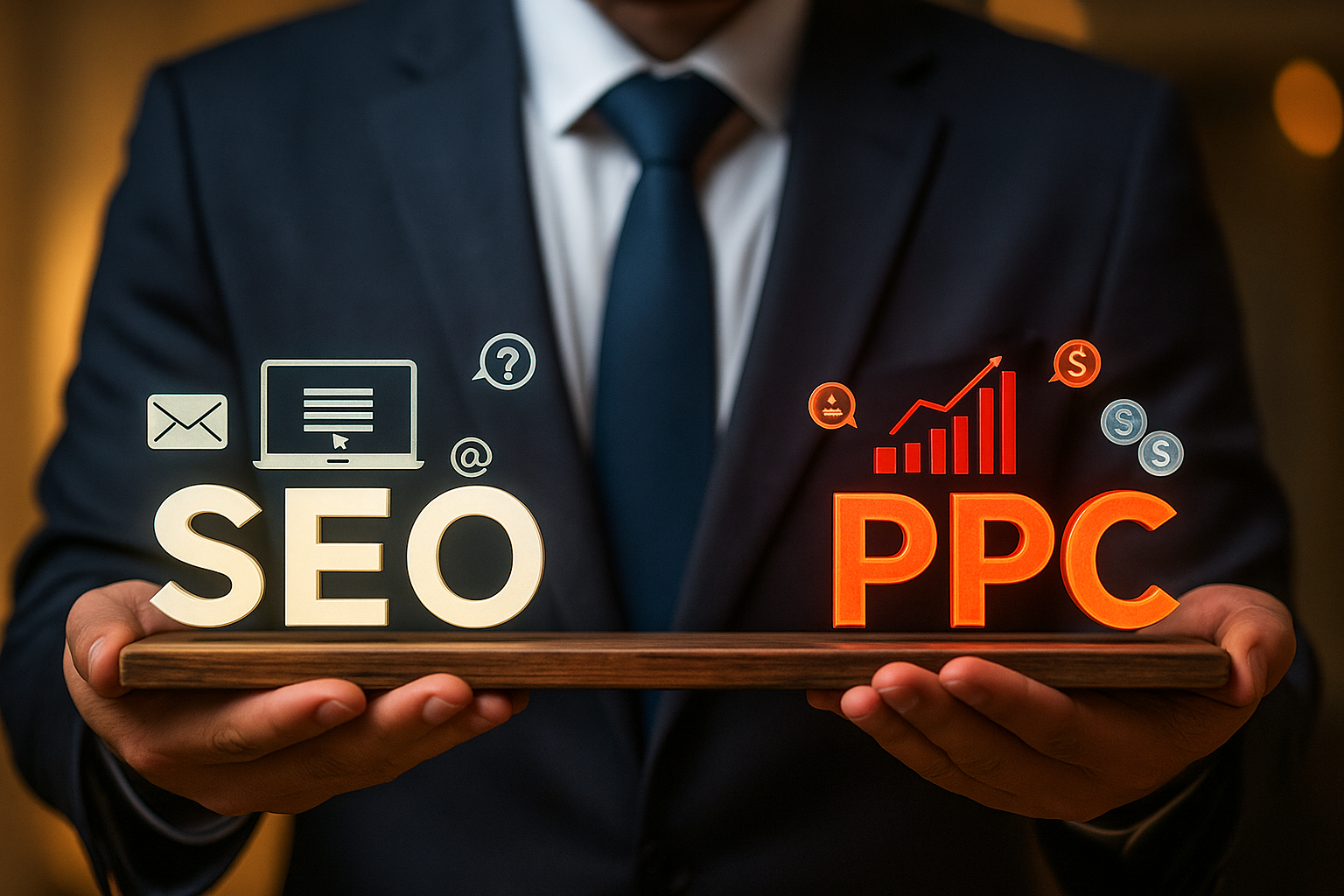Search marketing is often discussed in terms of PPC or SEO. One relies on organic visibility, while the other provides instant paid traffic. But treating them as competitors is a mistake. When used together, SEO and PPC services can create a smarter, more cost-effective strategy that accelerates growth and maximizes ROI.
Before we dive into how they support one another, let’s quickly break down what each does on its own.
What Is SEO?
Search engine optimization (SEO) is the process of improving a website’s visibility in search results on platforms like Google or Bing. The goal is to attract free, recurring traffic by ranking higher for relevant search terms.
A strong SEO strategy includes:
- Keyword research: Identifying the terms your target audience searches for.
- Content writing: Creating high-quality pages, blogs, and guides.
- On-page SEO: Optimizing titles, headings, meta descriptions, and images.
- Off-page SEO: Building authority through backlinks and digital PR.
- Technical SEO: Ensuring your website loads fast, is mobile-friendly, and easily crawlable.
SEO is considered a long-term strategy because building authority and ranking for competitive terms takes time. New websites often face more challenges than older, established domains.
The main advantage of SEO is cost efficiency. Once a page ranks, it can drive traffic and leads for months (or even years) without additional spend. It also establishes credibility and brand trust.
What Is PPC?
Pay-per-click (PPC) is a digital advertising model where businesses pay each time someone clicks on an ad. These ads can appear on Google, Bing, Facebook, LinkedIn, Instagram, or other platforms.
Key features of PPC include:
- Instant visibility: Your ads appear at the top of search results or in highly visible social feeds.
- Precise targeting: You can reach users by location, interests, demographics, and behavior.
- Flexible budgeting: You control daily or campaign-level ad spend.
- Performance-based pricing: You only pay when someone clicks, not when the ad is shown.
The cost of PPC depends on industry, competition, and ad quality. For instance, “insurance” keywords can cost over $50 per click, while less competitive niches may pay under $2.
Unlike SEO, PPC is a short-term strategy because traffic stops when you stop paying. But it’s powerful for generating leads and sales immediately.
What’s the Difference Between SEO and PPC?
At a glance:
- SEO = long-term, organic, sustainable growth.
- PPC = short-term, paid, immediate traffic.
SEO takes months to build momentum but delivers higher ROI over time. PPC delivers instant visibility but requires an ongoing budget.
Rather than debating PPC or SEO, the smart approach is to use both together — balancing long-term organic growth with short-term paid results.
How PPC Supports SEO
PPC campaigns generate data that can accelerate and strengthen SEO efforts.
- Test keywords quickly: See which keywords drive clicks and conversions, then prioritize them in SEO content.
- Inform content strategy: If an ad has a high click-through rate (CTR), create blog posts or landing pages targeting that keyword.
- Bridge ranking gaps: For competitive terms that take months to rank for organically, PPC ads secure immediate visibility.
- Understand user intent: PPC analytics show exactly how people search, helping refine SEO strategies.
Example: If “SEO pay per click advertising” performs well in PPC, writing a blog optimized for that keyword could capture organic traffic too.
How SEO Supports PPC
Good SEO improves the quality and efficiency of PPC campaigns.
- Boost Quality Score: Google rewards fast, relevant, SEO-optimized landing pages with lower ad costs.
- Refine ad messaging: Use insights from SEO content performance to craft ad copy that resonates.
- Discover long-tail keywords: SEO analytics often reveal high-intent search terms you can add to PPC.
- Grow remarketing audiences: SEO-driven traffic expands the audience for retargeting ads.
Integrated Strategies for Maximum Impact
When SEO and PPC work together, businesses see far better results than with isolated campaigns.
- Dominate the SERP: Showing up in both paid and organic spots doubles visibility and builds credibility.
- Cover the customer journey: SEO content captures early-stage researchers; PPC targets ready-to-buy customers.
- Maximize ROI: Use PPC for immediate wins, then scale back as SEO rankings strengthen for those keywords.
- Align teams and data: Sharing insights between SEO consultants and PPC managers creates smarter campaigns.
A Google study found that paid ads can retain up to 89% of clicks even when a site already ranks #1 organically, proof that combining ads and SEO amplifies performance.
Final Thoughts
SEO and PPC aren’t rivals; they’re partners. Together, they help businesses:
- Capture traffic at every stage of the funnel.
- Improve efficiency and ROI, and
- Build both immediate and lasting growth.
If you’re ready to scale, look for a partner that offers SEO and PPC services in one strategy. When executed together, your SEO and PPC campaigns will work in harmony, giving you the competitive edge you need in today’s digital landscape.
FAQs
Q: Can PPC and SEO be used together?
A: Yes. Combining PPC and SEO creates a stronger marketing strategy and drives both immediate and long-term traffic.
Q: Which is better, PPC or SEO?
A: Neither works best alone. PPC gives instant results while SEO builds sustainable, long-term growth.
Q:How does PPC help SEO?
A: PPC provides keyword and user data, tests ad copy, and secures visibility for competitive terms while SEO rankings improve.
Q:How does SEO help PPC?
A: SEO improves landing page quality, informs ad messaging, discovers long-tail keywords, and grows audiences for retargeting.
Q:Is it expensive to run both PPC and SEO?
A: Costs vary by industry and campaign size. Using both strategically can maximize ROI by combining short-term wins with long-term growth.

